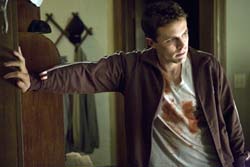 Forget the tabloid headlines of Bennifer days gone by. Forget the comparisons with buddy Matt’s soaring career. You can even forget the “Good Will Hunting” albatross of being labeled a one-hit wonder as a writer. Ben Affleck’s career redemption is complete–it started when he wisely began taking smaller character roles in movies like “Hollywoodland”–with his directorial debut of the thriller “Gone Baby Gone.” Though critics have been quick to lump “Gone” in with “The Departed” and “Mystic River” because “Gone” also takes place in a seedy Boston neighborhood. However, with Affleck’s directing (he also serves as a co-writer) and brother Casey’s mesmerizing performance, “Gone” is a daring morality play that, in many respects, I found far more authentic and interesting than either of those other Boston-based films.
Forget the tabloid headlines of Bennifer days gone by. Forget the comparisons with buddy Matt’s soaring career. You can even forget the “Good Will Hunting” albatross of being labeled a one-hit wonder as a writer. Ben Affleck’s career redemption is complete–it started when he wisely began taking smaller character roles in movies like “Hollywoodland”–with his directorial debut of the thriller “Gone Baby Gone.” Though critics have been quick to lump “Gone” in with “The Departed” and “Mystic River” because “Gone” also takes place in a seedy Boston neighborhood. However, with Affleck’s directing (he also serves as a co-writer) and brother Casey’s mesmerizing performance, “Gone” is a daring morality play that, in many respects, I found far more authentic and interesting than either of those other Boston-based films.
When a little girl is kidnapped, Patrick Kenzie (Casey Affleck), a low-rent private eye who works out of his home with his girlfriend in his childhood neighborhood, is the unlikely choice to become involved with the police in solving the case. Though it is never really explained why the baby-faced Patrick took up this career path and never amounted to much, what is clear is that his motives for helping the victim’s family are pure. He wants nothing more than to bring the girl home. He makes inroads with the locals that the police and special agents cannot, and before long, it seems as if the case has been solved.
Through a series of plot twists, however, Patrick realizes the case is not solved, and as he tries to uncover the truth, he is sucked into making some painful choices. Some he regrets; others, he doesn’t.
There are several reasons why I think “Gone” is superior to the movies it is being compared with. While “Mystic River” and “The Departed” seem to revel in moral ambiguity and violent theatrics, “Gone” does neither. The story unfolds methodically and without a lot of cinematic pizzazz, and the movie’s emotional punch is the stronger because of that. “Gone” also seems to say that that in a society that thrives on moral relativity, there is still a clear-cut truth in the midst of all of the gray. (The opening voiceover lays out the advice Patrick received from a priest when he was young and foreshadows the rest of the story.) Even while I realize some people interpret the final shot of the film as deliberately vague, I saw it as Patrick’s committment to follow through on his decision.
Even if you end up being like much of the audience I saw the movie with and you find yourself hating the ending of “Gone Baby Gone,” you will probably agree that the movie raises important questions about how we justify the decisions we make–and don’t make.


